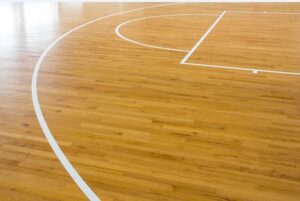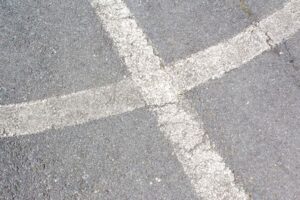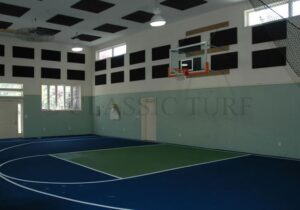 Did you know that the game of basketball got its start because a man named Dr. James Naismith was looking for a way to condition young athletes during cold months?
Did you know that the game of basketball got its start because a man named Dr. James Naismith was looking for a way to condition young athletes during cold months?
Basketball, as we know it today, started in an indoor gymnasium in Springfield, Massachusetts back in 1891, with the first public game taking place March 11, 1892. At the time, Dr. Naismith was a physical education teacher looking for a game his students could play that wouldn’t involve as many injuries as football. As a bonus, the game needed to be something played indoors, since winter weather in New England meant snow, ice and freezing cold temperatures outdoors. Thus, Naismith came up with the idea to use peach baskets atop poles at both ends of an indoor court whereas players competed to see which team could get a ball into those baskets most often during a set time period.
As a sport, basketball became very popular rather quickly. Soon after its introduction in Massachusetts, many colleges copied the idea and came up with their own basketball teams playing games in indoor gymnasiums, typically on hardwood floors. Games were also played at YMCAs around the country. Meanwhile, the NBA formed in 1946 and, as you know, to this day basketball is one of the world’s most popular sports– and an important part of American culture. Professional basketball players like LeBron James, Michael Jordan, Kobe Bryant and Larry Bird have become household names synonymous with the famous and beloved sport.
While the personalities and scoring abilities of players help garner the sport loads of attention worldwide, basketball wouldn’t be possible without a proper place to play it. Over the years, many arenas, gyms and parks have been built with basketball courts as their main focus. If basketball courts could talk imagine the many stories of triumph and defeat they could tell.
 Though it’s not something the average person thinks about, basketball court playing surfaces differ— they can be hardwood (typically maple), combinations of rubber and acrylic materials, and/or made from tried-and-true things such as concrete and asphalt. Obviously, the type of surface depends on where the game is to be played and who is involved in the games. An NBA court will be fancier than one found in a local park. Richer communities will have nicer courts that are better maintained and safer than their poorer counterparts.
Though it’s not something the average person thinks about, basketball court playing surfaces differ— they can be hardwood (typically maple), combinations of rubber and acrylic materials, and/or made from tried-and-true things such as concrete and asphalt. Obviously, the type of surface depends on where the game is to be played and who is involved in the games. An NBA court will be fancier than one found in a local park. Richer communities will have nicer courts that are better maintained and safer than their poorer counterparts.
While many basketball players are used to indoor courts made from hardwood, those who play outdoors are generally used to playing on asphalt or concrete.
Are asphalt and concrete generally strong and able to withstand outdoor weather? Yes. But one of the main problems they have is this: they break down over time. Have you ever tried playing basketball on an asphalt court that had cracks and potholes in it? A player could easily sprain their ankle when the chipped asphalt causes them to stumble. It can be quite unsafe. The same goes for playing on concrete with cracks in it– one bad move and a player could be in the hospital getting their bruise stitched up. Ideally, players want to play on flawless courts that don’t pose a safety hazard.
The Benefits of Post-Tension Concrete Basketball Courts
 For those who live where the winter weather can be brutal, what kind of basketball court works best outdoors? Classic Turf Company of Connecticut makes courts using what’s called “post tension concrete technology.” These type of courts work well in New England as well as anywhere that gets ice and snow each winter. Classic Turf Company builds courts that offer the buyer a 20-year crack-free guarantee. If that sounds pretty amazing, it is! How can they offer this?
For those who live where the winter weather can be brutal, what kind of basketball court works best outdoors? Classic Turf Company of Connecticut makes courts using what’s called “post tension concrete technology.” These type of courts work well in New England as well as anywhere that gets ice and snow each winter. Classic Turf Company builds courts that offer the buyer a 20-year crack-free guarantee. If that sounds pretty amazing, it is! How can they offer this?
Post tension concrete is constructed in a way to withstand abuse and whatever the climate throws at it. To explain it in layman’s terms, normal concrete in the ground is stuck in one spot and when tension comes upon it, cracks will happen. Post tension, though, is made to essentially “move” or “adjust” so that it doesn’t have to crack. This flexible leeway built into the concrete that forms the court makes it the smartest choice for outdoor basketball courts available today.
If you’re thinking about having a basketball court installed on your property and you want one that’s well-made and won’t crack, then Classic Turf Company is who to call. Please call 1-800-246-7951 to connect with a representative from Classic Turf who can answer all your questions.
